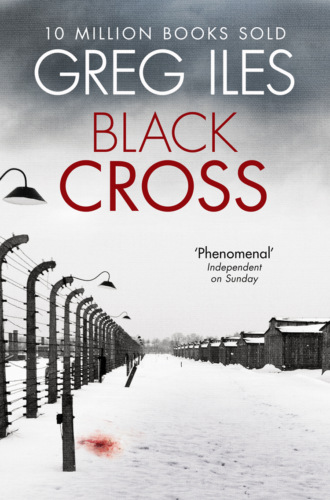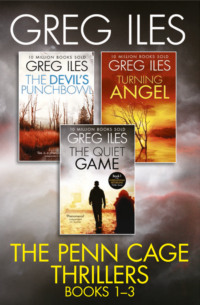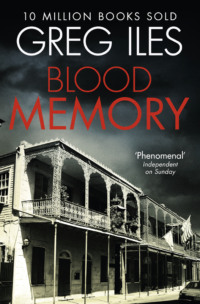
Полная версия
Black Cross
“Wrong. It was because you acted just like Dad did when he was a kid.”
Mark shifted in his seat. “Maybe.”
“Maybe, hell. You know I’m right. But what you don’t know, or don’t want to know, is that you still act just like him.”
Mark stiffened.
“Our father—the great physician—spent most of his life inside our house. Hiding.”
“He was blind, for God’s sake!”
“No, he wasn’t,” David said forcefully. “His eyes were damaged, but he could see when he wanted to.”
Mark looked away, but didn’t argue.
“God knows his face looked bad, but he didn’t have to hide it. When I was a kid I thought he did. But he didn’t. People could’ve gotten used to him. To the scars.”
Mark closed his eyes, but the image in his mind only grew clearer. He saw a broken man lying on a sofa, much of his face and neck mutilated by blistering poisons that had splashed over half his body and entered his lungs. As a young boy Mark had watched his mother press cotton pads against that man’s eyes, to soak up the tears that ran uncontrollably from the damaged membranes. She would retreat to the kitchen to weep softly when she was sure his father slept.
“Mom never got used to them,” he said quietly.
“You’re right,” said David. “But it wasn’t his face. It was the scars inside she couldn’t handle. Do you hear what I’m saying? Dad was a certified war hero. He could’ve walked tall anywhere in America. But he didn’t. And do you know why, Doctor McConnell? Because he brooded too goddamn much. Just like you. He tried to carry the weight of the fucking world on his shoulders. When I enlisted in the air corps, he threatened to disown me. And that was from his deathbed. But long before that, he’d made you so scared and disgusted with the idea of war that he charted your whole life for you.” David wiped his brow. “Look, I’m not telling you what to do. You’re the genius in this family.”
“Come on, David.”
“Goddamn it, drop the phony bullshit! I was eight years behind you in school, and all the teachers still called me by your name, okay? I’m a flyer, not a philosopher. But I can tell you this. When Ike’s invasion finally jumps off, and our guys hit those French beaches, it’s gonna be bad. Real bad. Guys younger than me are gonna be charging fortified machine-gun nests. Concrete bunkers. They’re gonna be dying like flies over there. Now you’re telling me they might have to face this Sarin stuff. If you’re the guy who can stop Hitler from using it, or invent a defense against it, or at least give us the ability to hit back just as hard … Well, you’d have to do a lot of talking to convince those guys it’s right to do nothing at all. They’d call you a traitor for that.”
Mark winced. “I know that. But what you don’t understand is that there is no defense. The clothing required to protect a man from Sarin is airtight, and it’s heavy. A soldier could fight in it for maybe an hour, two at the most. GIs won’t even wear their standard gas masks in combat now, just because of a little discomfort. They could never take a defended beach in full body suits.
“So what are you saying? We’re whipped, let’s lie down and wait until we’re all eating Wiener Schnitzel?”
“No. Look, if Sarin is a German gas, Hitler has yet to use it. Maybe he won’t. I’m saying I won’t be the man that makes Armageddon possible. Someone else can have that job.”
David blinked his eyes several times, trying to focus on his watch. “Look,” he said, “I think I’m going to drive back up to Deenethorpe tonight.”
Mark reached across the table and squeezed his brother’s arm. “Don’t do that, David. I should never have brought this up.”
“It’s not that. It’s just … I’m so tired of the whole goddamn thing. All the guys I knew that never came back from raids. I stopped making friends two months ago, Mac. It isn’t worth it.”
Mark saw then that the bourbon had finally taken effect.
“I think about you a lot, you know,” David said softly. “When I feel those bombs drop out of Shady Lady’s belly, when the flak’s hammering the walls, I think, at least my brother doesn’t have to see this. At least he’s gonna make it back home. He deserves it. Always trying to do the right thing, to be the good son, faithful to the wife. Now I find out you’re dealing with this stuff …” David looked down, as if trying to perceive something very small at the center of the table. “I try not to think about Dad too much. But you really are just like him. In the good ways too, I mean. Maybe you’re right. Maybe he was right, too. I just don’t want to think about it anymore tonight. And if I’m here, there’s no way not to think about it.”
“I understand.”
Mark tipped the bartender as they left the pub, an act that always brought a wry smile from a man unused to the custom. David carefully tucked his nearly-empty bourbon bottle inside his leather jacket, then paused on the corner of George Street. “You’ll do the right thing in the end,” he said. “You always do. But I don’t want to hear another word about any forward surgical unit. You’re a real asshole sometimes. You must be the only guy in this war trying to think of ways to get closer to the fighting instead of away from it.”
“Except for officers,” Mark said.
“Right.” David looked up the blacked out street, then down at his captain’s bars. “Hey, I’m an officer, you know.”
Mark punched him on the shoulder. “I won’t tell anybody.”
“Good. Now where did I park that goddamn jeep?”
Mark grinned and took the lead. “Follow me, Captain.”
FOUR
Twenty miles from the dreaming spires of Oxford, Winston Spencer Churchill stood stiffly at a window, smoking a cigar and peeking through a crack in his blackout curtains. The three men seated behind him waited tensely, watching the cigar’s blue smoke curl up toward the red cornice.
“Headlights,” Churchill said, a note of triumph in his voice.
He turned from the window. His face wore its customary scowl of pugnacious concentration, but these men knew him well. They saw the excitement in his eyes. “Brendan,” he said gruffly. “Meet the car outside. Show the general directly to me.”
Brendan Bracken, Churchill’s former private secretary, Man Friday, and now Minister of Information, hurried to the main entrance of Chequers, one of the country estates that the prime minister used as a wartime hideaway.
Churchill quietly regarded the two men left in the room. Sitting rigid by the low fire was Brigadier Duff Smith. The fifty-year-old Scotsman’s empty left coat sleeve was pinned to his shoulder; the arm that should have filled it was buried somewhere in Belgium. A personal friend of Churchill, Smith now directed Special Operations Executive, the paramilitary espionage organization whose primary directive, penned by Churchill in 1940, was to “SET EUROPE ABLAZE.”
To Brigadier Smith’s right stood F.W. Lindemann, now Lord Cherwell. An Oxford don and longtime confidante, Lindemann advised the prime minister on all scientific matters, and monitored the work of a gaggle of geniuses—gleaned mostly from Oxford and Cambridge—who labored twenty hours a day to increase the Allies’ technological advantages over the Germans.
“Are we quite ready, gentlemen?” Churchill asked pointedly.
Brigadier Smith nodded. “As far as I’m concerned, Winston, it’s an open and shut case. Of course, there’s no guarantee Eisenhower will see it our way.”
Professor Lindemann started to speak, but Churchill had already straightened at the sound of boots in the hallway. Brendan Bracken opened the door to the study and General Dwight D. Eisenhower strode in, followed by Commander Harry C. Butcher, his naval aide and friend of long standing. Sergeant Mickey McKeogh, Eisenhower’s driver and valet, took up a post outside the door. The last American to enter was a major of army intelligence. He was not introduced.
“Greetings, my dear General!” Churchill said. He moved forward and pumped Eisenhower’s hand with all-American enthusiasm. His red, black, and gold dressing gown contrasted strangely with the American general’s simple olive drab uniform.
“Mr. Prime Minister,” Eisenhower replied. “It’s good to see you again, though unexpected.”
The two men’s eyes met with unspoken communication. Last month’s conferences at Cairo and Teheran had not gone off without tensions between the two men. With the invasion less than five months away, Churchill still had reservations about a cross-Channel thrust into France, preferring to attack Germany through what he called the “soft underbelly” of Europe. Eisenhower, though he had just been named Supreme Commander of the Allied Expeditionary Force, was still adjusting to the mantle of power and had yet to assert his primacy in matters of strategy.
“An uneventful trip up from London, I hope?” Churchill said.
Eisenhower smiled. “The fog was so thick on Chesterfield Hill that Butcher had to get out and walk ahead of the car with a flashlight. But we made it, as you can see.” He crossed the room and respectfully shook hands with Brigadier Smith, whom he’d known since 1942. Everyone else was introduced, excepting the American major of intelligence, who remained silent and stiff as a suit of decorative armor beside the closed study door.
Churchill rescued his dying cigar from an ashtray and walked over to his desk. He did not sit. This was the atmosphere he liked—his Parliamentary milieu—him on his feet, speaking to a captive audience sitting on its collective ass. He picked up something small off the desk and rolled it in his palm. It appeared to be a bit of ornamental glass.
“Gentlemen,” he began, “time is short and the matter at hand grave. So I’ll be brief. The Nazis”—he pronounced the word Narzis, with a slur that managed to simultaneously convey both contempt and menace—“are up to their old tricks again. And some new ones as well. At the very moment when the tide seems to be turning irrevocably in our favor—I daresay on the very cusp of invasion—the Hun has sunk to new depths of frightfulness. He has apparently decided that no scientific abomination is too ghastly to use in his quest to stave off disaster.”
Though well-accustomed by now to Churchill’s flamboyant rhetoric, Eisenhower listened intently. He had only just arrived from North Africa via Washington, and any hint of new information about the European theater tantalized him.
Churchill rolled the piece of glass in his hand. “Before I proceed, I feel I must restate that this meeting, for official purposes, never occurred. No entries should be made in private diaries to record it. I am even breaking my own inviolate rule. No one will be asked to sign the guest book when they leave.”
Eisenhower could stand no more buildup. “What the devil are you talking about, Mr. Prime Minister?”
Churchill held up the piece of glass he’d been fidgeting with. It was a tiny ampule. “Gentlemen, if I were to shatter this vial, every man-jack of us would be dead within a minute.”
This was vintage Churchill, the dramatic prop, the verbal bombshell. “What the hell is it?” Eisenhower asked.
The prime minister bit down on his cigar and lowered his round head in a posture of challenge. “Gas,” he said.
Eisenhower squinted his eyes. “Poison gas?”
The prime minister nodded slowly, deliberately, then pulled the cigar from his mouth. “And not the kitchen stuff we choked on during the last war, though God knows that was bad enough. This is something entirely new, something absolutely monstrous.”
Eisenhower noted that Churchill had used the word “we” in reference to suffering poison gas attacks. He wondered if this was a veiled allusion to the fact that he had not seen combat in the First World War, having served those years training tank troops in Pennsylvania. If Churchill was probing for a sore spot, he had found it. “Well,” he said curtly, “what kind of gas is it?”
“They call it Sarin. And it’s a bloody miracle we’ve even found out about it. We can all thank Duff Smith for that.” Churchill looked at the one-armed SOE chief, willing him to his feet. “Brigadier?”
Duff Smith, a seasoned veteran of the Cameron Highlanders regiment, stood with quiet confidence. “Thirty days ago,” he said with a vestigial Highland lilt, “we learned that our worst suspicions about the German chemical effort were accurate. Not only have they been pursuing weapons research at breakneck speed since before the war, but they’ve also been producing new gases and stockpiling them all over the country.”
“Just a minute,” Eisenhower broke in. “We’ve been doing the same thing, haven’t we?”
“Yes and no, General. Our programs didn’t really get cracking until we realized how much Germany had accomplished between the wars. And, quite frankly, we’ve never managed to catch up.”
“Are we talking about nerve agents?” asked the American major of intelligence, speaking for the first time. “We’ve known about Tabun for some time.”
“Something of quite another magnitude,” Smith said a bit testily. “The clearest indication of danger is that the Nazis have resumed testing these gases on human victims, mostly at SS-run concentration camps in Germany and Poland. These experiments have resulted in death for the exposed inmates in one hundred percent of the cases. We believe the Germans are setting up to deploy nerve gas against our invasion troops.”
Eisenhower cut his eyes at Commander Butcher.
“Did you say a hundred percent fatalities?” asked the army major. “Due strictly to the gas?”
“One hundred percent,” Smith confirmed. “Thirty days ago, the Polish Resistance managed to smuggle a sample of Sarin out of a camp in northern Germany. Two days later we delivered that sample to one of Lindemann’s chemical weapons specialists at Oxford.”
This time it was Eisenhower who interrupted. “I thought the British chemical warfare complex was at Porton Down, on Salisbury Plain.”
“In the main,” Smith responded, “that is correct. But we also have scientists working independently in other locations. Helps to keep everyone honest.”
Churchill broke in. “I think Professor Lindemann is better equipped to fill us in on the technical details. Prof?”
The famous British scientist had been fussing with a battered pipe which stubbornly refused to light. He made one last attempt and was surprised by success. He puffed seriously for a few moments, then looked at the Americans and began to speak.
“Yes … well. In the Great War, you’ll remember, chemi-cal agents were classified by the Germans under the ‘cross’ system. That is, each gas cylinder or artillery shell was painted with a cross of a particular color, depending on what type of gas it contained. There were four colors. Green denoted the suffocating gases, mainly chlorine and phosgene. White for irritants, or tear gases. Yellow Cross indicated the blister gases, primarily mustard. Blue was for the gases that blocked molecular respiration—cyanide, arsine, carbon monoxide.”
General Eisenhower lit a second cigarette off his first and inhaled with great concentration.
“Eleven months ago,” Lindemann continued, “just after the German surrender at Stalingrad, we learned of the existence of Tabun. Tabun was interesting because it worked in an entirely different way than any previous gas, by crippling the central nervous system. Yet because it was not significantly more lethal than phosgene, we didn’t overreact. But we did realize that our own chemical weapons weren’t much further along than in 1918, and we moved to correct the imbalance. Sarin—while it shares some characteristics of Tabun—is a completely different animal.”
“I’m a little fuzzy on my chemistry,” Eisenhower said with disarming frankness. “What makes Sarin so different?”
Lindemann knitted his eyebrows. “Unlike most poison gases, General, Sarin is absolutely lethal. In 1939, the deadliest battlefield gas in the world was phosgene.” He paused to give his next statement the necessary emphasis. “Sarin is thirty times as deadly as phosgene. In sufficient concentration it can kill within seconds, and it need not even enter the lungs. It can pass directly through human skin.”
“Jesus Christ.” Eisenhower had blanched. “How does this stuff work?”
Lindemann considered the American commander for some moments. “General, every function of the human body, both conscious and unconscious, is controlled by the brain. Much as a general controls his troops. The brain passes its orders down to the organs and the limbs by means of nerve branches. The nerves are the couriers of the brain, you might say. When the brain sends a message down a nerve, a compound called acetylcholine is produced. Now, at this point, the nerve has temporarily lost its conductivity. The courier, having delivered his message, can no longer run. The nerve can only be restored to its conductive state by an enzyme called cholinesterase. Without this enzyme, the nerves of the body are nothing but dead tissue. The couriers die where they lie.”
“And this gas,” said Eisenhower, “Sarin. It destroys this enzyme, this …?”
“Cholinesterase,” supplied the major of intelligence.
“Precisely,” said Lindemann.
Eisenhower pursed his lips. “Exactly how much of this stuff would it take to kill a soldier?”
Lindemann answered with his pipe clenched between his teeth. “One thousandth of a raindrop. A droplet so small most of us couldn’t see it with the naked eye.”
Churchill noted the stricken look on Eisenhower’s face. The meeting was going just as he’d planned.
“Our people at Porton have been working round the clock to copy Sarin,” Lindemann went on, “but I’m afraid they haven’t had much luck. It’s devilish difficult to reproduce.”
“I’m afraid the Germans are having all the luck just now,” Churchill said dryly. “And there’s worse to come. Prof?”
“Yes. General, Brigadier Smith brings word of a still deadlier gas than Sarin. It is called Soman. We don’t have a sample, but I’ve seen a detailed report. Remember your lethality ratios. Phosgene was the deadliest gas in 1939. Sarin is thirty times as deadly as phosgene. And according to the reports, Soman is to Sarin as Sarin is to phosgene. Worse, it’s persistent.”
“Persistent?” Eisenhower echoed.
The American major chose this moment to reassert himself. “General, persistence was one of the primary gauges of gas effectiveness during World War One. How long the gas stayed at ground level after it was released.”
Lindemann nodded. “We have reports that Soman can remain stable for many hours, even days, clinging to whatever it comes into contact with. A soldier exposed even several hours after a battle would still likely die. And it would be a horrible death, General, I can assure you.”
“Do we have any idea how much of this stuff the Germans have stockpiled?”
Brigadier Smith cleared his throat. “General, our best estimate is upwards of five thousand tons, ready for use.”
The intelligence major was stunned enough to preempt his general. “Did you say tons?”
Churchill nodded crisply. “Conventional cylinders, aircraft bombs, artillery shells, the lot.”
Eisenhower held out his right hand to Churchill. “Let me see that damned thing.”
Churchill tossed the sealed vial toward the sofa. Commander Butcher and Brendan Bracken jumped, but Eisenhower caught the vial and held it up to a lamp. “I can’t see anything,” he said. “Just some condensation at the bottom.”
“That’s because it’s invisible,” Churchill said. “Prof?”
“Eh?” Lindemann was fussing with his pipe again.
“The delivery system. Aerosols vecteurs?”
“Right. General, when the Nazis overran Belgium in 1940, they scoured the universities for technology that might further their weapons research. I’m sorry to say that they came across the work of a rather talented chemist named Dautrebande. Dautrebande had been experimenting with a new concept he called aerosols vecteurs. In plain language, he’d found a way to reduce almost any substance to its smallest stable state: charged particles in suspension, refined to ninety-seven percent purity. He intended to use this technology to disperse healing agents in sealed hospital rooms. Obviously, the Nazis have other uses in mind.”
“Remember,” said Churchill, “the paramount consideration in gas warfare is the element of surprise. With Dautrebande’s system, the Nazis could saturate an entire battle area with Soman before anyone even knew they were under attack. And we have no idea how aerosols might affect current protective equipment. It could render it totally obsolete.”
Eisenhower stood and began pacing the room. “All right, you didn’t invite me here to describe the problem. What do you want to do about this?”
Churchill didn’t hesitate. “I want the Eighth Air Force and Bomber Command to begin hitting the German stockpiles immediately. All known nerve gas factories should be added to the master target lists and given top priority.”
“Good God,” murmured Commander Butcher, whose former job had been a vice presidency at the Columbia Broadcasting System. “A direct hit could send clouds of lethal gas rolling across Germany. Thousands of women and children might be killed. From a propaganda standpoint alone—”
“If,” Churchill interrupted, “our air forces, in the course of bombing Germany’s industrial base, happen to set free something we had no way of knowing was there … I don’t see how we could be blamed.”
The ruthlessness of Churchill’s suggestion silenced the Americans.
Eisenhower stopped pacing. “Correct me if I’m wrong, but up to this point the Germans have not deployed poison gas on the battlefield. Not even against the Russians. True?”
“That’s true,” Churchill admitted. “Though they are murdering captive Jews with cyanide gas.”
Eisenhower ignored this. “Therefore, we must assume that Hitler is restraining himself, even in the face of terrible losses, for the same reason that he has not used biological weapons. Because our intentional intelligence leaks to the Germans let them know in no uncertain terms that we have the means to retaliate in kind.”
Churchill gave a conciliatory nod. “General, in the case of biologic weapons our leaks were quite truthful. However, in the area of chemical weapons you’ll find that we exaggerated a bit. All in a good cause, to be sure. To buy ourselves time. But with the invasion imminent, our time has run out.”
Eisenhower turned to his intelligence major. “Just what do we have in our chemical arsenal?”
“Loads of phosgene,” the major said defensively. “We’re stockpiling sixty days’ worth of retaliatory gas for D-Day. And new shipments of mustard are arriving all the time.”
Eisenhower frowned. “But nothing like Sarin?”
“No, sir.”
“Nor Soman.”
The major shook his head. “Not even close, sir.”
“Jesus H. Christ.” Eisenhower looked around the room. “Gentlemen, I think it might be better if the prime minister and I continue this conversation alone.”
“Brendan,” Churchill said, barely controlling the excitement in his voice, “you and Duff give our American friends some tea and biscuits. Clemmie will show you where everything is. And I believe the Prof has a late appointment.”
Lindemann glanced suddenly at his watch. “Good Lord, Winston, you’re right.” The tall don gathered up his hat and coat and started for the door, only at the last moment remembering that he was leaving the presence of the Supreme Commander of the Allied Expeditionary Force. He turned and tipped his hat to Eisenhower.
“Godspeed, General,” he said, and was gone.
FIVE
Dwight D. Eisenhower furiously smoked a cigarette at the very window where Churchill had awaited his arrival. During the past forty minutes, he had sat mostly in silence, chain-smoking Lucky Strikes while the prime minister painted nightmare scenarios of the eleventh-hour appearance of Sarin and Soman on the D-Day beaches. Finally, Eisenhower turned from the window.







